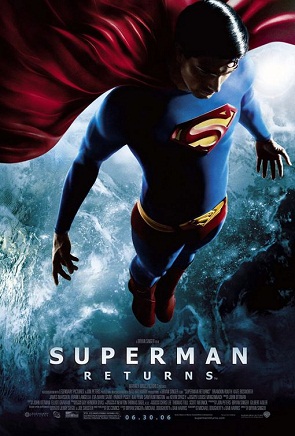Movie Review: SUPERMAN RETURNS (2006)

Superman Returns (2006) – ****
Superman Returns may be the comic book film equivalent of Peter Jackson’s adventure drama King Kong. Both films are beautifully nostalgic, firmly existing in the midst of the Art Deco style of the 1930s. Both films add a melodramatic story-line to what has in the past been a one-dimensional adventure. Most importantly, both films are so intimately associated with the characters that inspired them that it is impossible to not be enthralled by the majesty of it all.
Superman’s story is more communal than Kong’s, though. The iconic American superhero is so firmly situated in our collective unconscious that no part of his history can be ignored. Bryan Singer, with the knowledge of a fan boy and the capacity of a Spielberg or a Jackson, creates with Superman Returns what will in time be considered the definitive comic book adaptation.
What would the world be like without a Superman? If you turn on the TV and see the destruction and tragedy that Kal-El (Brandon Routh) saw when he returned from a five year trip to the remains of his home planet Krypton you will understand as he does that he, Superman, is a savior to the human race. Truth, justice and all that stuff, as Daily Planet editor Perry White puts it, still matter.
When Superman makes a return to Metropolis by casually saving a plane full of reporters, the Man of Steel must confront his feelings for the one reporter who knew him best—Lois Lane (Kate Bosworth). The two share a history. However, Supes’ alter ego and Lane co-worker Clark Kent starts to discover that Lois really did move on from Superman in his five year absence, and she has a kid and a fiancée to prove it.
Still, the lives of Superman and Lois Lane seem destined to be intertwined. If only Lex Luthor (Kevin Spacey) wasn’t preparing to use Kryptonian technology given to Kal-El by his father (Marlon Brando) and his knowledge of crystals to create a super continent and sink most of the world in the process. Before he can get to Lois, Superman has to deal with all that.
The film ends without Lois and Superman coming together, not that I would expect it to end any other way. Like the Spider-Man films, Superman Returns proves that the heart cannot be contained in one film. (There has to be a sequel.) Like the first flight of a great serial, Superman Returns establishes the Man of Steel once again as a character worth getting to know.
Superman Returns isn’t all heart though. What makes it the hallmark of the comic book adaptations of the early 21st Century is its acknowledgement of its pulpy origins. The Singer crew captures the whimsical caricatures much like Richard Donner did when he made the first blockbuster Superman film in 1978. It’s not a campy humor like that contained in Raimi’s Spider-Man 2, but rather a capturing of the fun side of the comic book world.
With that being said, Superman Returns flies beyond my every possible expectation, altering the mythos just slightly for dramatic effect while indulging in Superman’s vivid and brilliant world on land, air and sea. The film is full of cinematic poetry, individual scenes with artistic imagery one would never associate with a comic book film. That, of course, makes Superman Returns a grand cinematic epic that rivals not only Superman: The Movie, but also The Lord of the Ringsin terms of ambition and scope.
I’d say something about the performances, but there’s little to say. Routh isn’t Christopher Reeves, but fits nicely into his boots. Likewise, Kate Bosworth lets Lois Lane take control instead of her controlling Lois. Both are adequately undistracting.
The bad guys do deserve a bigger mention. Spacey is a damn fine replacement for Gene Hackman as Luthor. He manages to make the menacing criminal mastermind into something appropriately more sinister as the stakes have been raised. Only Parker Posey, who plays Luthor’s right-hand lady, can receive real credit as a standout. She seems to best understand the character she is playing because Kitty Kowalski lacks the baggage of expectation and possesses an unexpected charm. Posey exemplifies all that is great about the film.
While I expected the references to Superman iconography, I couldn’t help feeling overwhelmed by the film’s combination of the traditional and contemporary, the soul and the body. When the film opens with John Ottman’s adaptation of John Williams’ Superman Theme playing over the Donner-style credits, I was in awe of this film. When Superman makes his final exit and all the Donner-universe references mixed with the new mythology have been seen, simple awe has been surpassed by emotional bedazzlement. Superman has returned and this work of cinematic art is what this icon needed to not just be reinvigorated, but also reborn.











No Comments
Trackbacks/Pingbacks